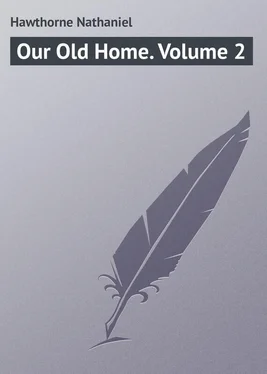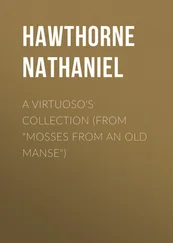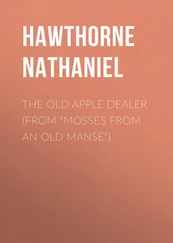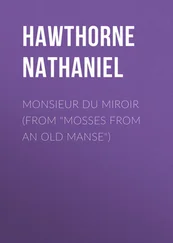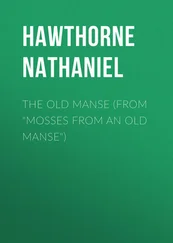Nathaniel Hawthorne - Our Old Home. Volume 2
Здесь есть возможность читать онлайн «Nathaniel Hawthorne - Our Old Home. Volume 2» — ознакомительный отрывок электронной книги совершенно бесплатно, а после прочтения отрывка купить полную версию. В некоторых случаях можно слушать аудио, скачать через торрент в формате fb2 и присутствует краткое содержание. Жанр: foreign_prose, Путешествия и география, foreign_language, на английском языке. Описание произведения, (предисловие) а так же отзывы посетителей доступны на портале библиотеки ЛибКат.
- Название:Our Old Home. Volume 2
- Автор:
- Жанр:
- Год:неизвестен
- ISBN:нет данных
- Рейтинг книги:3 / 5. Голосов: 1
-
Избранное:Добавить в избранное
- Отзывы:
-
Ваша оценка:
- 60
- 1
- 2
- 3
- 4
- 5
Our Old Home. Volume 2: краткое содержание, описание и аннотация
Предлагаем к чтению аннотацию, описание, краткое содержание или предисловие (зависит от того, что написал сам автор книги «Our Old Home. Volume 2»). Если вы не нашли необходимую информацию о книге — напишите в комментариях, мы постараемся отыскать её.
Our Old Home. Volume 2 — читать онлайн ознакомительный отрывок
Ниже представлен текст книги, разбитый по страницам. Система сохранения места последней прочитанной страницы, позволяет с удобством читать онлайн бесплатно книгу «Our Old Home. Volume 2», без необходимости каждый раз заново искать на чём Вы остановились. Поставьте закладку, и сможете в любой момент перейти на страницу, на которой закончили чтение.
Интервал:
Закладка:
We asked for Burns's dwelling; and a woman pointed across the street to a two-story house, built of stone, and whitewashed, like its neighbors, but perhaps of a little more respectable aspect than most of them, though I hesitate in saying so. It was not a separate structure, but under the same continuous roof with the next. There was an inscription on the door, bearing no reference to Burns, but indicating that the house was now occupied by a ragged or industrial school. On knocking, we were instantly admitted by a servant-girl, who smiled intelligently when we told our errand, and showed us into a low and very plain parlor, not more than twelve or fifteen feet square. A young woman, who seemed to be a teacher in the school, soon appeared, and told us that this had been Burns's usual sitting-room, and that he had written many of his songs here.
She then led us up a narrow staircase into a little bedchamber over the parlor. Connecting with it, there is a very small room, or windowed closet, which Burns used as a study; and the bedchamber itself was the one where he slept in his later lifetime, and in which he died at last. Altogether, it is an exceedingly unsuitable place for a pastoral and rural poet to live or die in, – even more unsatisfactory than Shakespeare's house, which has a certain homely picturesqueness that contrasts favorably with the suburban sordidness of the abode before us. The narrow lane, the paving-stones, and the contiguity of wretched hovels are depressing to remember; and the steam of them (such is our human weakness) might almost make the poet's memory less fragrant.
As already observed, it was an intolerably hot day. After leaving the house, we found our way into the principal street of the town, which, it may be fair to say, is of very different aspect from the wretched outskirt above described. Entering a hotel (in which, as a Dumfries guide-book assured us, Prince Charles Edward had once spent a night), we rested and refreshed ourselves, and then set forth in quest of the mausoleum of Burns.
Coming to St. Michael's Church, we saw a man digging a grave, and, scrambling out of the hole, he let us into the churchyard, which was crowded full of monuments. Their general shape and construction are peculiar to Scotland, being a perpendicular tablet of marble or other stone, within a framework of the same material, somewhat resembling the frame of a looking-glass; and, all over the churchyard, these sepulchral memorials rise to the height of ten, fifteen, or twenty feet, forming quite an imposing collection of monuments, but inscribed with names of small general significance. It was easy, indeed, to ascertain the rank of those who slept below; for in Scotland it is the custom to put the occupation of the buried personage (as "Skinner," "Shoemaker," "Flesher") on his tombstone. As another peculiarity, wives are buried under their maiden names, instead of those of their husbands, thus giving a disagreeable impression that the married pair have bidden each other an eternal farewell on the edge of the grave.
There was a foot-path through this crowded churchyard, sufficiently well worn to guide us to the grave of Burns; but a woman followed behind us, who, it appeared kept the key of the mausoleum, and was privileged to show it to strangers. The monument is a sort of Grecian temple, with pilasters and a dome, covering a space of about twenty feet square. It was formerly open to all the inclemencies of the Scotch atmosphere, but is now protected and shut in by large squares of rough glass, each pane being of the size of one whole side of the structure. The woman unlocked the door, and admitted us into the interior. Inlaid into the floor of the mausoleum is the gravestone of Burns, – the very same that was laid over his grave by Jean Armour, before this monument was built. Displayed against the surrounding wall is a marble statue of Burns at the plough, with the Genius of Caledonia summoning the ploughman to turn poet. Methought it was not a very successful piece of work; for the plough was better sculptured than the man, and the man, though heavy and cloddish, was more effective than the goddess. Our guide informed us that an old man of ninety, who knew Burns, certifies this statue to be very like the original.
The bones of the poet, and of Jean Armour, and of some of their children, lie in the vault over which we stood. Our guide (who was intelligent, in her own plain way, and very agreeable to talk withal) said that the vault was opened about three weeks ago, on occasion of the burial of the eldest son of Burns. The poet's bones were disturbed, and the dry skull, once so brimming over with powerful thought and bright and tender fantasies, was taken away, and kept for several days by a Dumfries doctor. It has since been deposited in a new leaden coffin, and restored to the vault. We learned that there is a surviving daughter of Burns's eldest son, and daughters likewise of the two younger sons, – and, besides these, an illegitimate posterity by the eldest son, who appears to have been of disreputable life in his younger days. He inherited his father's failings, with some faint shadow, I have also understood, of the great qualities which have made the world tender of his father's vices and weaknesses.
We listened readily enough to this paltry gossip, but found that it robbed the poet's memory of some of the reverence that was its due. Indeed, this talk over his grave had very much the same tendency and effect as the home-scene of his life, which we had been visiting just previously. Beholding his poor, mean dwelling and its surroundings, and picturing his outward life and earthly manifestations from these, one does not so much wonder that the people of that day should have failed to recognize all that was admirable and immortal in a disreputable, drunken, shabbily clothed, and shabbily housed man, consorting with associates of damaged character, and, as his only ostensible occupation, gauging the whiskey, which he too often tasted. Siding with Burns, as we needs must, in his plea against the world, let us try to do the world a little justice too. It is far easier to know and honor a poet when his fame has taken shape in the spotlessness of marble than when the actual man comes staggering before you, besmeared with the sordid stains of his daily life. For my part, I chiefly wonder that his recognition dawned so brightly while he was still living. There must have been something very grand in his immediate presence, some strangely impressive characteristic in his natural behavior, to have caused him to seem like a demigod so soon.
As we went back through the churchyard, we saw a spot where nearly four hundred inhabitants of Dumfries were buried during the cholera year; and also some curious old monuments, with raised letters, the inscriptions on which were not sufficiently legible to induce us to puzzle them out; but, I believe, they mark the resting-places of old Covenanters, some of whom were killed by Claverhouse and his fellow-ruffians.
St. Michael's Church is of red freestone, and was built about a hundred years ago, on an old Catholic foundation. Our guide admitted us into it, and showed us, in the porch, a very pretty little marble figure of a child asleep, with a drapery over the lower part, from beneath which appeared its two baby feet. It was truly a sweet little statue; and the woman told us that it represented a child of the sculptor, and that the baby (here still in its marble infancy) had died more than twenty-six years ago. "Many ladies," she said, "especially such as had ever lost a child, had shed tears over it." It was very pleasant to think of the sculptor bestowing the best of his genius and art to re-create his tender child in stone, and to make the representation as soft and sweet as the original; but the conclusion of the story has something that jars with our awakened sensibilities. A gentleman from London had seen the statue, and was so much delighted with it that he bought it of the father-artist, after it had lain above a quarter of a century in the church-porch. So this was not the real, tender image that came out of the father's heart; he had sold that truest one for a hundred guineas, and sculptured this mere copy to replace it. The first figure was entirely naked in its earthly and spiritual innocence. The copy, as I have said above, has a drapery over the lower limbs. But, after all, if we come to the truth of the matter, the sleeping baby may be as fitly reposited in the drawing-room of a connoisseur as in a cold and dreary church-porch.
Читать дальшеИнтервал:
Закладка:
Похожие книги на «Our Old Home. Volume 2»
Представляем Вашему вниманию похожие книги на «Our Old Home. Volume 2» списком для выбора. Мы отобрали схожую по названию и смыслу литературу в надежде предоставить читателям больше вариантов отыскать новые, интересные, ещё непрочитанные произведения.
Обсуждение, отзывы о книге «Our Old Home. Volume 2» и просто собственные мнения читателей. Оставьте ваши комментарии, напишите, что Вы думаете о произведении, его смысле или главных героях. Укажите что конкретно понравилось, а что нет, и почему Вы так считаете.
